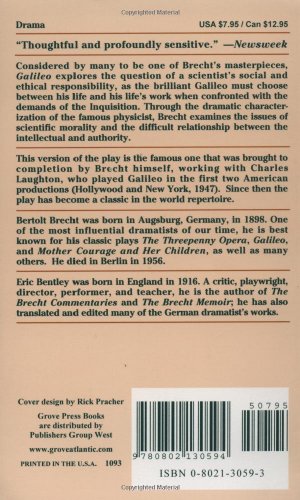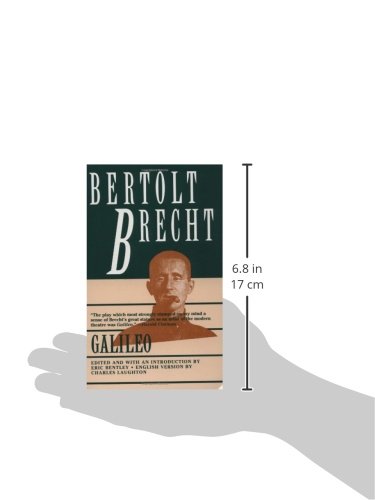Deliver to Ukraine
IFor best experience Get the App




Galileo
S**E
Took him 8 years to write this???
Did not enjoy this play. Felt boring and its significance seems overblown
P**D
Galileo summuary
It was very interesting reading and a wonderful look at how Galileo viewed his look on science vs. church and I enjoyed the how he was abled to complete the work under house arrest.
R**A
Three Stars
Interesting a fast read. Not very accurate history but has lots of implied social commentary.
M**C
Perfect for what was needed
Bought this for my husband for a class, he had no complaints! Came fast and was what he needed
H**E
GOOD BOOK
This book is really riveting; there is a lot of subtle symbolism and the plots and social commentary really tells a lot about the time period this was written.
S**O
Five Stars
Perfect!
C**S
Did Galileo win or did he lose?
This is an excellent play which can be read quickly in a few hours. The play is preceded by an introduction by Eric Bentley which I will also review. Following the play is an appendix where Brecht elaborates on five aspects of telling the truth which are relevant to the play and make an interesting commentary following the play.Bertolt Brecht uses the life of Galileo to comment upon his own times and conditions but it is the strength of the play that it would and could reflect upon the entire human condition and situations where a new truth challenges a well established ideology.The story is well established in history that Galileo discovered various aspects around the movement of the planets and the moon which challenged Christian orthodoxy, he is allowed some flexibility by the church in recognition of his status, but eventually he is forced to recount his writings as fictitious and not reflective of the larger truth taught by Christianity. It is to Brecht’s great credit that the Cardinals, Pope, Bishop, and inquisitors are for the most part portrayed as highly educated, sophisticated men who greatly appreciated how a challenge to Christian orthodoxy could be the first step in undermining the entire conceptual faith model that Christianity had built over a period of 1000 years. To allow that the earth revolves around the sun opens up the possibility that there was not a virgin birth or a resurrection, concepts on which Christianity hangs. Galileo was up against wise men, not fools, and they were strong defenders of the Christian conceptual model and the infrastructure of the church which is built upon that conceptual foundation.There are some interpretations of the play, which are certainly as valid as my interpretation, that the play is about how scientists may be used by the political powers to do harm rather than to do good to mankind. The problem I have with this interpretation is that often scientists have no idea all of the potential uses of the science they produce. Once knowledge is developed and released, it is actually out of the control of the scientist and he or she cannot stop the use of that knowledge for bad ends. It is actually rare for a scientist to make a discovery and immediately realize how it might be put to criminal or evil ends, thus requiring the scientist to hide the truth. The concept as to whether it is possible to hide truth is explored in the final scenes of the play when Galileo reveals that while appearing to bow to the authority of the Church, he has been writing a book that challenges the prevailing concepts of the cosmos.When a system of truth, such as Christianity, becomes fully institutionalized, then there is considerable force and energy expended to support that truth system. The Roman Catholic Church is an outstanding example of this in that the truth they support has been fine tuned so that all parts run smoothly and thus a challenge to any part of the well oiled conceptual machinery is a threat to the entire conceptual machine. Notice that the Princes of the Church are very sophisticated and Galileo treats them as such. Galileo knows he must comply with their demands, he does so, is allowed to live in peace, while secretly he continues his work and especially his writing which he knows will live on past him. The disgust that Galileo expresses toward himself seems to be less about the fact that science may be used or misused and rather is related to wounded pride and ego that he has been put in the position of having to hide his work and perform outward humility toward a system that he doubts is valid. What good would have come of it had Galileo refused to cooperate and been tortured and possibly burned at the stake? This would have made his oppressors appear more inhumane but it does nothing to move truth forward. Science is a social construct to a degree but empiricism and observability are on its side which tilts the scales toward eventual dissemination of knowledge and building a social infrastructure around that truth system.One reviewer indicated that Galileo demonstrates moral cowardice in that he allowed the power structure to crush him into recanting his work and that he also denied those who could benefit from his work. Maybe this is what Brecht meant, but I certainly think the issue is more complex. Galileo, like many brilliant persons, recognized fully the cognitive gifts he had been given and thus his torture and executive would be to no good purpose. His deal with the forces of oppression bought him time in which to fully explore.The introduction by Eric Bentley is very interesting and the fact that Brecht wrote two endings of the play is fascinating and certainly supports the multiple lessons or meanings that can be obtained from his play. I wish both versions of the play were published here since Brecht’s struggle with this play and the messages he wished to convey would be fascinating reading. It is the final version, which was published and seen by the public in dramatic performances that is published here.
C**S
Telling the truth
This is a classic play about the struggle to sustain the truth when writing. The main character, Galileo himself, is given room for an actor and director to interpret fully. We see his human and his intellectual sides. Reading it really made me want to see a production, or even different productions. This copy includes a great essay by Brecht, "Writing the Truth: Five Difficulties", that offers advice much needed in these Trump-ridden times. "The dependence of everything upon many factors which are constantly changing is an idea dangerous to dictators, and this idea can appear in many guises without giving the police anything to put their finger on." From this idea, Brecht concludes, "Cunning is necessary to spread the truth."
C**N
Ok
Ok
A**U
Must read, Must buy.
Good packaging. The book came in good condition. and what a play! Must read, must buy . <3 Brecht.
Trustpilot
1 week ago
2 weeks ago